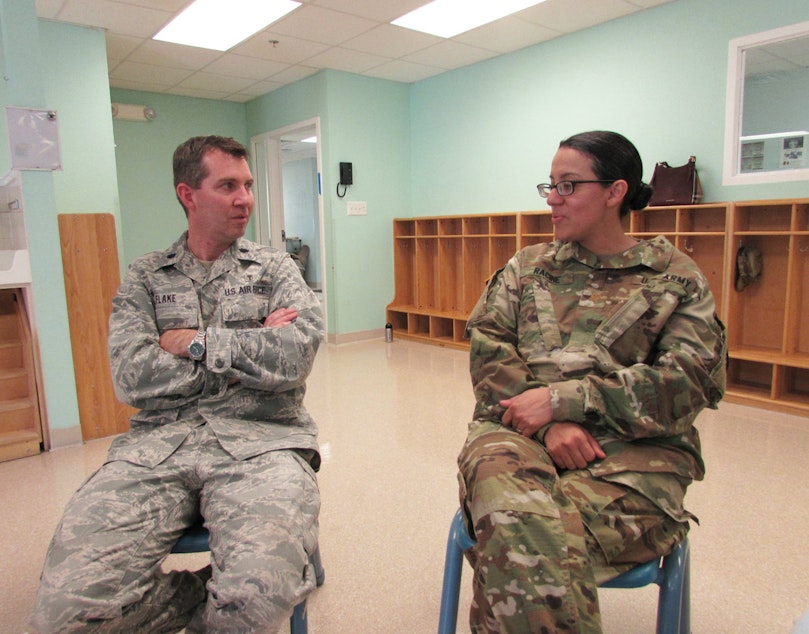New center for treating autism at JBLM will fill a 'therapy gap'

While stationed in Germany, Army nurse practitioner Major Ruth Racine and her husband carved out a promising educational and therapeutic plan for their seven-year-old son Magnus, who has autism.
“We were in an absolutely fantastic place," Racine said. Magnus got occupational, physical and speech therapy.
“He was in a developmental program, and he had speech therapy that he was getting inside the classroom. And then we had also lined up speech therapy in the community, as well as occupational therapy, and he was starting physical therapy,” Racine said.
But about a year a half ago Racine was transferred to Joint Base Lewis-McChord in Tacoma, Washington. Magnus still gets some therapy in his new school, but getting the outside help he needs is a problem.
Those services aren’t available on base, and local therapists in the community are in high demand.
“When you call the place to say, 'OK, great, I have my referral letter, I have my son who needs this,' they’ll say, 'OK, great, but right now we don’t have room for you. We’ll put you on a waitlist.' And you’re on a waitlist for five different places," Racine said.
She’s still waiting, and so are a lot of other U.S. military families with autistic children at bases around the world.
Now the Army is planning to open its first therapy center for autistic children at Madigan Army Medical Center in Tacoma.
The new center comes after years of complaints from military families that it’s nearly impossible to find appropriate and timely therapy for autistic children. If successful, there’s hope it can be replicated at other installations.
When Penn State University conducted a survey of 189 military spouses, the majority said they’ve had difficulty obtaining services for their children. There are more than 23,000 military dependents with an autism diagnosis.
Gretchen Shea, a regional administrator for the online group American Military Families Autism Support, often hears concerns from parents about timely and available care. Her husband is in the Navy stationed at Whidbey Island, Washington.
They have two children with autism. Shea said military families deal with added layers of paperwork and move often; waitlists only further interrupt continuity of care.
“That’s definitely an issue that we run into as a whole I think, as a military community. The waitlists are there because everybody needs either after school or there’s only one or two speech therapists for a huge area,” Shea said.
Lt. Col Eric Flake, a physician and the director of Madigan Army Medical Center’s developmental and behavioral pediatric program, hopes the Army’s first standalone therapy and education center for children with autism and their families will help.
“There's going to be programs to teach parents as they have a new diagnosis. A large focus will be in some group after-school therapy opportunities. Additionally during the work day this will also be a therapy center where kids will get direct speech therapy, will get direct occupational therapy,” Flake said.
He hopes by early next year the center will take some of the pressure off families and help a lot of kids. “We anticipate great outcomes; ones that will be measured, ones that will be identified. And we’ll be able to report those back and demonstrate that impact," Flake said.
Major Racine believes it’ll make a big difference for her family.“My husband sent me the link for the Facebook page for this program and tears came to my eyes immediately, because as a parent, this represents hope," she said.
But Shea from the military families group has mixed feeling about the project.
The center will serve only 150 children at JBLM. While she’s happy those families will benefit some, she said the Department of Defense needs to do a lot more to serve autistic children everywhere.
“That’s a great start. I do feel that it's just a drop in the bucket," Shea said.
Neither the Army Surgeon General's Office nor the Defense Health Agency would speculate about the future of the program. They haven’t said whether they might build similar programs at other bases to serve the thousands of other autistic military children whose parents are struggling to find timely care.

